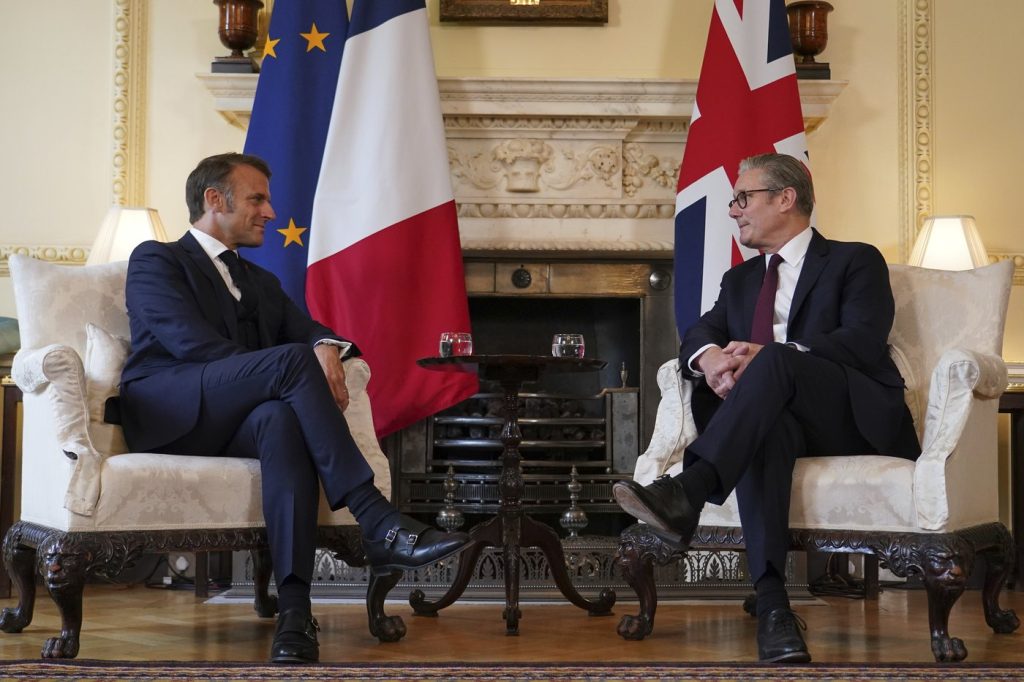LONDON (AP) — After a series of formal engagements during a state visit, Prime Minister Keir Starmer of the United Kingdom and President Emmanuel Macron of France are focusing on a pressing issue that has challenged both nations: the prevention of unauthorized migration across the English Channel via small boats.
In a summit set for Thursday, which concludes Macron's three-day visit, senior representatives from both countries will seek to finalize agreements on economic growth, defense collaboration, and address the critical issue of illegal migration. The leaders are also scheduled to tour a military base and engage in a planning session for the " coalition of the willing, " a strategic initiative to establish an international force to support a ceasefire in Ukraine.
During a meeting at 10 Downing Street on Wednesday, Starmer and Macron highlighted the shared urgency of tackling small boat crossings, agreeing on the need for collaborative strategies, including new deterrents to disrupt the operations of people-smuggling networks, as stated by Starmer's office. They both expressed hopes for achieving "concrete progress" during their discussions on Thursday.
While the United Kingdom experiences fewer asylum-seekers than Mediterranean countries, the high visibility of migrants crossing the 20-mile (32-kilometer) Channel in small, overcrowded boats continues to be a significant concern. In 2024, roughly 37,000 migrants were detected making such crossings, with over 20,000 reported in the first six months of 2025 alone, marking a 50% increase compared to the same timeframe the previous year. Unfortunately, the crossings have also resulted in numerous fatalities.
Both nations recognize the dangers and complexities surrounding these unregulated crossings, yet they have historically differed in their approaches to resolving the problem. The U.K. has sought increased action from France to deter boats from departing the French beaches, providing financial support amounting to hundreds of millions of pounds for enhanced patrols and intelligence sharing projects to combat smuggling operations.
"We share information to a much greater extent than was the case before," Starmer affirmed during a session in the House of Commons. He noted the establishment of a new specialized intelligence unit in Dunkirk and emphasized the U.K. government’s success in persuading France to revise its laws and strategies concerning border security.
Macron, on the other hand, has insisted that the U.K. must address "pull factors" that attract unauthorized migrants, such as the perception of ease in securing employment in the U.K. Many of these migrants have familial ties in Britain or are English speakers, further motivating their crossings.
Efforts to find solutions have been ongoing since 2001, initially focusing on preventing migrants from stowing away on trains and trucks using the Channel Tunnel. Over the years, France has dismantled camps near Calais, where many migrants congregated before attempting to reach the U.K. Increased security measures successfully reduced vehicle stowaways; however, since around 2018, smuggling networks have redirected their focus to maritime routes.
Mihnea Cuibus, a researcher from the University of Oxford’s Migration Observatory, described the ongoing dynamic as a "game of cat and mouse," where authorities crack down on existing smuggling methods, only to see gangs adapt and discover new routes.
Cooperation between the two nations on addressing boat crossings stagnated after the U.K.'s departure from the European Union in 2020. Nevertheless, recent years have brought forth several agreements, with the U.K. financially assisting France in bolstering police and drone patrolling along the coastline. The previous Conservative government had devised a controversial 2022 plan proposing the deportation of asylum-seekers who arrived by boat to Rwanda. This initiative, criticized as both unworkable and unethical, was promptly annulled by Starmer following his taking office in July 2024.
Starmer is now prioritizing enhanced collaboration with France and other transit countries to stem the flow of migrants from Africa and the Middle East. British officials have been advocating for more decisive French action against boats as they leave the shore, welcoming recent instances where French police actively prevented crossings by slashing rubber dinghies used by migrants.
Additionally, France is considering a "one-in, one-out" proposal from the U.K., which would involve France agreeing to accept some migrants already in the U.K. in exchange for the U.K. allowing entry for migrants seeking to reunite with family members in Britain. Macron has stated that the two leaders would strive for "tangible results" regarding this issue that poses a burden on both nations.
Cuibus noted the persistent challenge of irregular cross-Channel migration but acknowledged that the measures currently being discussed by the U.K. and France could potentially yield positive outcomes, contingent on effective implementation.











